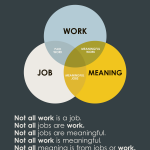For several years I’ve believed that corporatism is one of the primary systemic problems that we need to change in order to address our challenges of global warming, political instability, fundamentalism, poverty, education or environmental degradation. One of the more astute business blogs that I read is Bubblegeneration Strategy Lab (BGSL), where umair says it like it is:
The real problem is that the firm – the corporation, as the fundamental institution of production – is deeply and irrevocably broken. It’s DNA is in shock. The corporation we’ve created is a monster; a form of organization growing more pathological by the day.
BGSL studies industries, markets, firms, and their economics. So those (really) are strong words.
But the evidence is, at this point, almost impossible to refute.
The good news is that there we have options and “the movement” is a source of many new models, whether it be micro-credit, community-supported agriculture, natural enterprises, etc.


He may have no clothes, Harold, but he still signs the cheques!
Aye, there’s the rub.
“The corporation we’ve created is a monster;
a form of organization growing more pathological by the day.”
All organizations, not only corporations, show signs of degradation over time.
This is a normal process. It is often a result of internal forces eventually
becoming stronger than the wrapper around them. Boom!
Many of our canadian institutions are showing signs of this degradation.
Our government, our police force, our universities are almost falling apart.
They are falling apart not because of external forces. They are falling apart because of what is happening inside. (Corruption, Unions, Bad elements rising to the top, Lack of touch with reality,empire building,Individuals with no respect for life or the environment, etc).
External forces such as globalization, global warming, resource depletion, and the Internet are like the needle that easily make the balloon
burst. They can’t make an orange explod.
I strongly believe that corporations are not fundamentally problematic to society. Most of the problems in this world are the result
of natural or probabilistic processes. We won’t improve things until we think about problems properly.
Fortunately external forces somehow fixes things without us requiring to understand problems.
GB
One of the flaws with current corporatism is that the disembodied corporation gets the rights of a human, with none of the obligations. This can create a system of having no one held responsible for their actions (Exxon-Valdez, WorldCom, Enron). The idea of limited liability provides a shield for the sociopathic behaviour corporations. What happened in Bhopal with Union Carbide is another example of corporatism not serving humankind and not taking responsibility. Governments and bureaucracies assume more responsibility, but even they hide behind the body corporate.
I still believe that the structure of corporations is a prime systemic flaw within our society that allows a small cohort to act with impunity.
After I read Gilbert’s comment, I was going to write something similar to what you have outlined, Harold.
It’s not the existence of an organized group of people pursuing some purpose or offering goods and services per se that is a core problem, it’s the conceptual, legal and detached-from-human-purposes structure of corporations as we know and understand them that is problematic.
An interesting, and now somewhat “old” book is David Korten’s “When Corporations Rule The World”.
he has since written another book that extends the main issues and arguments, and I can’t remeber the title at the moment .. hang on whilst I dive for Google.
Aha .. good ole wikipedia ;-)
“Dr. David C. Korten is an author and leader in the global resistance against corporate globalization. He is probably best known as the author of the book When Corporations Rule the World. His most recent book is The Great Turning: From Empire to Earth Community,[1] which places corporate globalization within the context of 5,000 years of “Empire,” used as a generic term for organizing human relationships by dominator hierarchy. Korten argues that the human system has now reached the limits of domination that social and environmental systems will tolerate. To secure its future, the human species must turn away from the dominator way of Empire to the partnership way of Earth Community, as defined by the principles of the Earth Charter.”
Oh, and .. I have found Umair Haque’s thinking to be consistently sound .. and provocative, at that.
I like provocative, we will need much more of that if we are to begin making constructive progress towards societies that work for the benefit of all, not just them what has the capital. Thomas Homer-Dixon said as much in The Ingenuity Gap.
Thanks, Jon. I’ll have to read The Great Turning. BTW, I’ll be in Montreal this week and will raise a glass to you; knowing how much you love the city.
Governments (remember Hitler) have been known to do more damage than corporations.
I certainly agree with Jon as how a detached-from-human-purposes structure can cause problems.
Still I think we are missing the point when we treat corporatism as evil or as a fundamental problem. Organizational behavior is different than individual behavior so when we treat corporations or other organizations as we would individuals we run into trouble.
Large organizations (corporate or other) must be held accountable for their actions. This applies to humatarian organizations also. Although corporations often support the effort it is countries that go at war.
About limited liability it is only recently that the supreme court of Canada decided that the RCMP are liable for damages resulting of their negligence and incompetence. There are many situations where the government still can’t be sued no matter how much damage has been done to individuals or communities.
Corporations rarely are protected by such immunity.
Of course it is crazy to hold corporations accountable. For the system to work it is the directors and employees of corporations who must be held accountable. We are seing a tendency towards accountability in the US.
Harold… The limited liability concept applies to corporations but I have also seen government employees get away with incredible things.
GB
Good point, Gilbert, it was government (initially the US Supreme Court) that gave corporations those rights in the first place.
Organizational behavior is different than individual behavior
IMO not so very much, though of course it depends upon the given individual(s) and corporation(s), notably as to how they value and enact values.
Organizational behavior often depends on the behavior of the individuals and processes that make up the organization. Unless proper management controls are in place it is not the corporate value that prevails. Even with good management controls the corporate values do not prevail all the time.
With individuals the behavior is mostly guided by the values of the individual.
The laws of numbers is at play within large organizations. The organization has goals but the individuals within the organization often have conflicting goals. A few employees can easily make a corporation do things that aren’t in line with the corporate goals.
Voting creates a situation where it is a differential value that prevails.
This is why I say organizational behavior is different than individual behavior. The motricity is different.
I think that the big problem in the world is an unfair distribution of wealth. Too much capital in the hands of a few is not a very healthy situation.
GB
I think that we’re all in agreement on some level, and are arguing the nuances.
For me, Rummler & Brache said it best, “If you pit a good person against a bad system, the system will win almost every time”.
Jeez, it’s been year and years … good old Rummler & Brache.
Thanks to both of you .. in addition to Gilbert’s key point about wealth distribution, which in turn I think enures to the notion of purpose in “managerial capitalism” (viz. Zuboff), it’s always important to (try to) get a sense of wherefrom an individual’s values are derived when they bump up against different values, say as provided from an organization’s management.
They show a documentary on Walmart on TV last night.
Although I felt the documentary was highly biased it certainly convinced me that that type of corporatism is not very healthy.
The shareholders didn’t seem to have much of a voice. Original share owners had too much power.
Maybe I should change my views on corporatism.
After I read Gilbert’s comment, I was going to write something similar to what you have outlined, Harold.